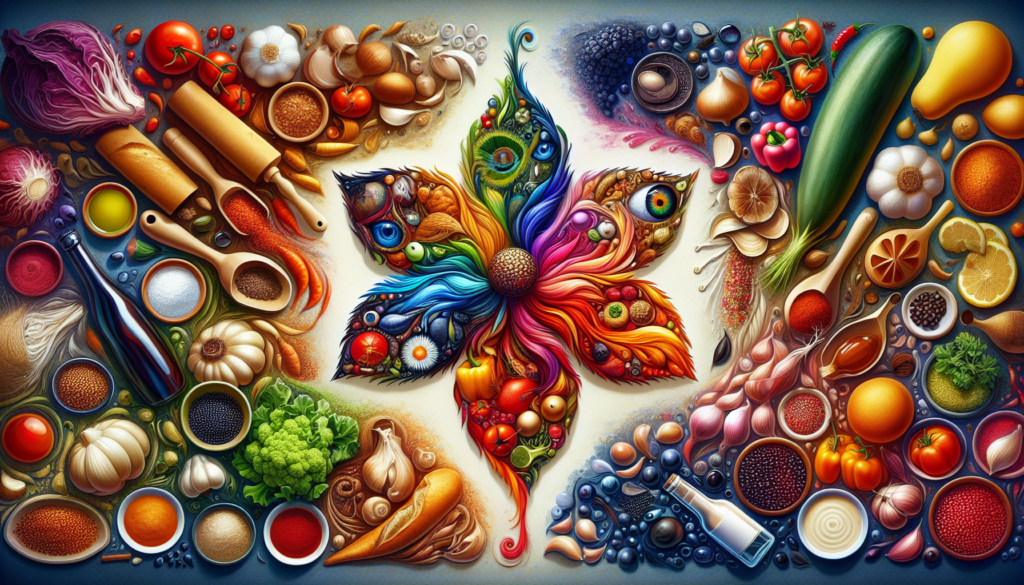Imagine sitting down to a delicious meal in a quaint French bistro, indulging in the exquisite flavors that have made French cuisine world-renowned. But have you ever wondered about the origins of these delectable dishes? Look no further than the influence of the Mediterranean. From the fresh seafood to the vibrant herbs and spices, the flavors of the Mediterranean have truly shaped the essence of French cuisine. Join us as we embark on a culinary journey through the rich history and cultural fusion that has resulted in the exquisite gastronomy that we know and love today.

Introduction
If you’ve ever had the pleasure of indulging in French cuisine, you may have noticed a certain flair and richness that sets it apart. The roots of French cuisine can be traced back centuries, and one significant influence that has shaped its flavors and techniques is the Mediterranean. From the shores of Provence to the vibrant markets of Nice, the Mediterranean has left an indelible mark on French cooking. In this article, we’ll explore the history of French cuisine, the Mediterranean influence, key ingredients, techniques, regional dishes, desserts, and even the connection between wine and the Mediterranean.
History of French Cuisine
Introduction to French Cuisine
French cuisine is revered around the world for its elegance and complexity. It has a long and storied history that dates back to the Middle Ages when French nobility began to embrace luxurious dining experiences. The foundations of French cuisine were set in place during the reign of Louis XIV, with culinary innovators such as François Pierre La Varenne and Marie-Antoine Carême making significant contributions to the development of French cooking techniques and principles.
Evolution of French Cuisine
Over the years, French cuisine has evolved and absorbed influences from various regions and cultures. One of the most significant influences came from the Mediterranean, which brought new flavors, ingredients, and techniques to French cooking. This fusion of Mediterranean and French culinary traditions resulted in a refined and distinctive cuisine that we know and love today.
The Mediterranean Influence
Introduction to Mediterranean Cuisine
Mediterranean cuisine encompasses the culinary traditions of countries bordering the Mediterranean Sea, including Greece, Italy, Spain, and, of course, France. It is characterized by fresh and seasonal ingredients, simple yet flavorful dishes, and a focus on healthy eating. Mediterranean cuisine places great importance on ingredients like olive oil, garlic, tomatoes, and a variety of herbs and spices.
Mediterranean Ingredients in French Cuisine
The flavors and ingredients of the Mediterranean have seamlessly integrated into French cuisine, adding depth and vibrancy to classic French dishes. The extensive use of olive oil, garlic, tomatoes, and herbs like basil, thyme, and oregano can be found in countless French recipes. These ingredients not only enhance the taste but also bring numerous health benefits.
Key Ingredients in Mediterranean Cuisine
Olive Oil
Olive oil is the heart and soul of Mediterranean cooking and plays a significant role in French cuisine. It is used for everything from sautéing vegetables to dressing salads and creating flavorful marinades. The rich and fruity flavors of extra virgin olive oil add a luxurious touch to French dishes, elevating their overall taste and texture.
Garlic
With its distinctive aroma and pungent taste, garlic adds boldness and complexity to both Mediterranean and French cuisine. In French cooking, garlic is used as a base for numerous sauces, soups, and stews, enriching them with its intense flavor. It is no wonder that garlic features prominently in beloved French dishes like Escargot à la Bourguignonne and Bouillabaisse.
Tomatoes
Tomatoes, introduced to France by way of the Mediterranean, have become a staple in French cuisine. Their vibrant color and natural sweetness enhance the flavor and appearance of many dishes. From the classic Provençal ratatouille to the hearty Coq au Vin, tomatoes bring a touch of the Mediterranean to French culinary traditions.
Herbs and Spices
Herbs and spices like basil, thyme, oregano, and rosemary are essential elements of both Mediterranean and French cooking. These aromatics add depth and complexity to dishes, providing a sensory experience that is characteristic of both cuisines. Whether used to season meats, infuse oils, or garnish salads, these herbs and spices bring the flavors of the Mediterranean to French tables.

Mediterranean Techniques in French Cooking
Braising
Braising, a cooking technique that involves slow-cooking meat or vegetables in a flavorful liquid, is heavily influenced by Mediterranean cooking. French cuisine has adopted this technique, using it to create tender and succulent dishes like Coq au Vin and Beef Bourguignon. The Mediterranean influence can be seen in the use of aromatic herbs, red wine, and slow simmering to develop deep and complex flavors.
Grilling
Grilling is a beloved Mediterranean cooking technique that imparts smoky flavors and charred accents to ingredients. In French cuisine, grilling is commonly used for meats, fish, and vegetables, resulting in dishes such as grilled lamb chops and vegetable kebabs. This technique showcases the simplicity and natural flavors that are characteristic of both Mediterranean and French culinary traditions.
One-Pot Cooking
One-pot cooking, where several ingredients are cooked together in a single pot, is a practical and efficient technique popular in Mediterranean and French cuisine. French dishes like Bouillabaisse, a hearty fish stew, and Ratatouille, a flavorful vegetable medley, exemplify one-pot cooking methods. This approach not only allows flavors to mingle and develop but also makes cleanup a breeze.
The Influence on Regional French Cuisine
Provencal Cuisine
In the region of Provence, the Mediterranean influence on French cuisine is particularly pronounced. With its sunny climate and abundance of fresh produce, Provencal cuisine showcases the flavors and aromas of the Mediterranean. Dishes like Salade Niçoise, with its combination of tomatoes, olives, anchovies, and beans, epitomize the fusion of Mediterranean and French culinary traditions.
Cuisine of Nice
Nice, located on the French Riviera, has a cuisine heavily influenced by its Mediterranean neighbors. The cuisine of Nice, also known as Niçoise cuisine, boasts dishes like Socca, a thin chickpea pancake, and Pan Bagnat, a sandwich bursting with Mediterranean flavors. The vibrant markets of Nice offer a tempting array of fresh produce, seafood, and herbs, reflecting the region’s deep connection to Mediterranean ingredients.
Cuisine of Corsica
Corsica, an island nestled in the Mediterranean Sea, has a unique cuisine that showcases both French and Italian influences. Corsican cuisine features dishes like Civet de Sanglier, a wild boar stew, and Fiadone, a tangy cheesecake. The island’s rugged landscape and fertile soil provide an ideal environment for ingredients like chestnuts, honey, and aromatic herbs to flourish, resulting in a distinct culinary tradition that captures the essence of the Mediterranean.
Popular Mediterranean-French Dishes
Bouillabaisse
Bouillabaisse, a traditional Provençal fish stew, is a perfect example of the fusion between Mediterranean and French cuisine. This hearty dish is prepared using a variety of fish and shellfish, combined with tomatoes, garlic, herbs, and saffron. The flavors meld together in a rich and fragrant broth, creating a satisfying and memorable dining experience.
Ratatouille
Ratatouille is a classic French dish that showcases the bounty of Mediterranean vegetables. Made with ingredients such as tomatoes, zucchini, eggplant, peppers, and herbs, this vegetable medley bursts with vibrant colors and flavors. Whether served as a side dish, a main course, or part of a filling tart, Ratatouille celebrates the simplicity and versatility of Mediterranean ingredients.
Tapenade
Tapenade, a popular Mediterranean spread, has found its way into French cuisine as a beloved condiment. Made from black olives, capers, garlic, anchovies, and olive oil, tapenade adds a bold and savory element to French dishes. From topping crostinis to enhancing roasted meats, this Mediterranean-inspired spread complements the flavors of various French creations.
Aioli
Aioli, a garlic-infused mayonnaise, is a staple in Mediterranean and French cuisine. Made with garlic, egg yolk, olive oil, and lemon juice, aioli adds a creamy and tangy dimension to numerous dishes. It is often served as a dip for vegetables, a spread for sandwiches, or a sauce for fish and seafood. This versatile condiment showcases the Mediterranean’s love for garlic and enhances the flavors of French dishes.
Mediterranean Influence on French Desserts
Fruit-Based Desserts
Fruits play a prominent role in Mediterranean desserts, and this influence can be seen in French patisserie as well. Tarts, compotes, and fruit-based cakes showcase the freshness and natural sweetness of Mediterranean produce. Whether it’s a classic Tarte Tatin with caramelized apples or a summery Peach Melba, these desserts celebrate the vibrant flavors of the Mediterranean and add a refreshing touch to French gastronomy.
Use of Honey and Nuts
Honey and nuts are essential ingredients in Mediterranean desserts and have found their way into French pastry as well. Honey adds a subtle sweetness and floral undertones, while nuts provide texture and richness. Traditional French desserts like Nougat, Baklava-inspired treats, and honey-infused almond cakes pay homage to the Mediterranean’s love for these delightful ingredients.
Pastries and Breads
The rich tradition of French pastries and breads has undoubtedly been influenced by Mediterranean baking techniques. Croissants, brioche, and pain au chocolat are examples of viennoiseries that have captured the hearts and taste buds of people worldwide. The delicate laminated pastry dough and the use of high-quality ingredients mirror the attention to detail and flavor found in Mediterranean baking traditions.
Wine and the Mediterranean Connection
Mediterranean Wine Regions
The Mediterranean is home to some renowned wine regions that have made their mark on the world’s viticulture. From the vineyards of Provence to the hills of Tuscany and the valleys of Spain, these regions produce wines that perfectly complement Mediterranean and French cuisine. The warm climate, fertile soil, and coastal influences contribute to the distinct character of Mediterranean wines.
Types of Mediterranean Wines
The Mediterranean produces a diverse range of wines, each with its own unique flavor profiles. In France, wines from Provence, such as Rosé and Bandol, are known for their light and elegant qualities. Italian wines like Chianti and Sangiovese showcase the country’s rich winemaking traditions. Spain offers bold and robust wines like Rioja and Priorat, which pair beautifully with the flavors of the Mediterranean.
Conclusion
The Mediterranean influence on French cuisine is undeniable. From the use of olive oil and garlic to the incorporation of Mediterranean ingredients and techniques, French cooking has been enriched by the flavors and traditions of the Mediterranean. The fusion of these culinary traditions has given birth to a vibrant and flavorful cuisine that continues to captivate food enthusiasts around the world. So the next time you savor a classic French dish, remember to give a nod to the Mediterranean and its enduring influence.
